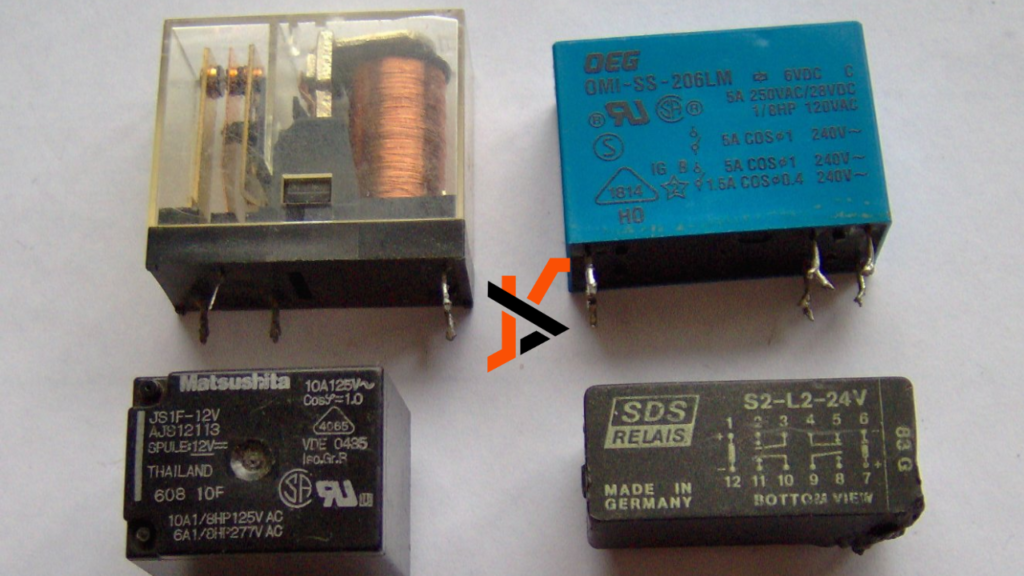Types of Electrical Relays
Relays come in several types, each designed for specific functions and applications.
- Electromechanical Relays (EMRs)
- General Purpose Relays: Used in simple switching operations.
- Power Relays: Designed to handle high current loads, often used in industrial applications.
- Reed Relays: Feature reed switches encased in a coil, known for their fast switching and compact size.
- Latching Relays: Maintain their position even when the control power is removed.
- Solid State Relays (SSRs)
- DC-to-AC SSRs: Convert DC control signals to AC load switching.
- DC-to-DC SSRs: Switch DC loads using DC control signals.
- AC-to-AC SSRs: Switch AC loads using AC control signals.
- Hybrid Relays
- Combine features of both electromechanical and solid-state relays to optimize performance and reliability.
- Time Delay Relays
- On-Delay Relays: Delay the activation of the relay.
- Off-Delay Relays: Delay the deactivation of the relay.
- Thermal Relays
- Operate based on the thermal effect of current, commonly used for motor protection.
Functions of Electrical Relays
Relays perform various crucial functions to ensure the efficient and safe operation of electrical systems.
- Switching: Relays can open or close contacts to control the flow of electricity in a circuit.
- Amplification: Small electrical signals can control large electrical loads, providing amplification.
- Isolation: Electrical isolation between control and load circuits enhances safety and reduces interference.
- Signal Conversion: Convert one type of signal to another (e.g., from AC to DC).
- Time Delay: Introduce time delays in circuits for various applications.
Applications of Electrical Relays
The versatility of relays makes them suitable for a wide range of applications across different industries.
- Automotive Industry
- Starting Systems: Control the starting process of engines.
- Lighting Systems: Manage headlight and indicator operations.
- Security Systems: Used in alarm and immobilizer systems.
- Industrial Automation
- Motor Control: Essential for starting, stopping, and reversing motors.
- Process Control Systems: Manage and control complex industrial processes.
- Safety Systems: Implement fail-safe mechanisms to protect equipment and personnel.
- Home Appliances
- HVAC Systems: Control heating, ventilation, and air conditioning units.
- Washing Machines: Manage various operational cycles.
- Microwave Ovens: Control the timing and power levels.
- Telecommunications
- Signal Routing: Direct signals to different circuits or paths.
- Line Switching: Used in telephone exchanges to connect calls.
- Power Systems
- Protective Relays: Safeguard electrical power systems by detecting faults and initiating circuit breakers.
- Load Shedding: Manage load distribution to prevent overloads.
- Medical Equipment
- Imaging Systems: Used in MRI and CT machines to control various functions.
- Life Support Systems: Ensure reliable operation of critical medical devices.
- Aerospace and Defense
- Navigation Systems: Control and switch navigation and communication equipment.
- Weapon Systems: Manage the operation and safety of weaponry.
Electrical relays play a very important role in modern electrical and electronic systems. Their diverse types, including electromechanical, solid-state, and hybrid relays, offer various functionalities such as switching, amplification, isolation, signal conversion, and time delay. The wide range of applications, from automotive to aerospace, underscores the importance of understanding and selecting the appropriate relay for each specific use case. Whether in simple home appliances or complex industrial systems, relays ensure efficient and reliable operation, making them indispensable components in today’s technology-driven world.
By exploring the different types, functions, and applications of electrical relays, one gains a comprehensive understanding of these crucial devices and their impact on various industries and everyday life. Check out Quotebeam Marketplace for any electrical relays – Quotebeam streamlines part procurement ensuring an easy way to find in-stock components such as electrical relays,

